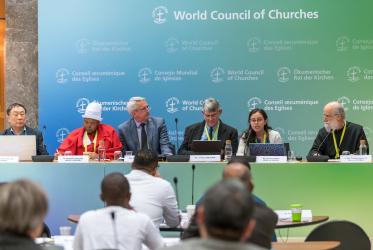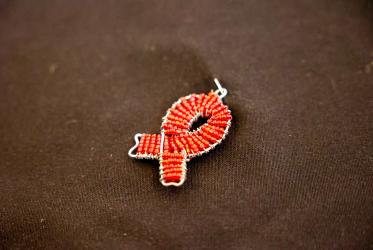Statement from CAPA AIDS board meeting
Nairobi Kenya
19-22 August 2002
We have concluded our second meeting of the AIDS Board of the Council of Anglican Provinces in Africa (CAP A). We have re-committed ourselves to the vision "of a Generation without AIDS", stated this time last year at the first All Africa Anglican Conference on HIV / AIDS at Boksburg.
Worldwide Communion says "AIDS is not punishment from God"
Our Church is a community of compassion and love. At a time when the African continent is being devastated by the HIV pandemic, where some 30 million have already been infected, our Anglican Communion has stated: "AIDS is not a punishment from God."
We affirm the words of the Primates from the across the world-wide Anglican Communion who also said, "We have a solemn duty to speak a word to the world o/the scale of this crisis." In that spirit, we are committed to enlisting all sectors of society and the faith communities of Africa in a "Partnership for Life".
International Debt Relief and access to care
In just a few days, the World Summit on Sustainable Development (WSSD) will be gathering in my home country of South Africa. We are deeply distressed that the African continent is simultaneously being ravaged AIDS.
We call upon the developed world to free us of the life-threatening burden of international debt, indebtedness, I might add, that many of our present governments did not incur. We know that debt forgiveness in sub-Saharan Africa, alone, could release more than $10 billion toward alleviating the pain and suffering of HIV/AIDS, which the United Nations says is needed in Africa today.
African conflicts fuel the AIDS pandemic
Wars, social and political instability, and conflict continue to plague us, as well. These struggles fuel the HIV / AIDS Pandemic. Even though peace is breaking out across Africa, there is still a long way to go to bring a level of peace and domestic tranquility. Food security, physical security, and commitment to public health and well-being are crucial.
We call on the governments of Africa that created the new African Union and NEPAD, to collaborate in making the eradication of HIV/AIDS a top priority. It is clear that there needs to be appropriate incentive schemes and strategies in the public and private sectors to make these efforts successful. We, in the faith-based communities, offer our collaboration and support so that Africa can save her children and guard her future. Our nations must move from rhetoric about the future to responsibility for today.
All African framework upheld
Over the course of these days we have affirmed the 6-fold call to responsibility for all of our churches. They are: Leadership, Care, Prevention, Counseling, Pastoral Care and Death and Dying. To this end, we are committed to ministering in and among all people.
Prevention saves lives
We are committed to teaching our children and their parents life-preserving skills to inhibit the virus that causes AIDS. The time for preparation for sexual maturity is well before adolescence and the onset of sexual activity. Our energies must focus on our daughters and sons at an early age. While we know that information alone cannot save lives, information and action can.
Knowing one's status is the first step
It is crucial for every person to know his/her HIV infection. Knowing one's status is the best way we can make informed and appropriate decisions about sexual behaviour and personal commitments. We call on our faith communities to ensure that Voluntary Counselling and Testing (VCT) is available to all people, including those in the Church.
Specific behaviours can save lives
We also know that there are some behaviours that will significantly reduce risk. These include:
-
abstinence before marriage;
-
fidelity and faithfulness within marriage;
-
delay the beginning of sexual activity for those who cannot remain abstinent, and I:J correct use of condoms, particularly for those couples in which one is HIV+ and the other is HIV-.
We know that condoms can save lives and prevent the spread of the virus. The morality of condoms is about preserving life. To sentence a person to death because of an error of judgment about sexual activity is not the way to save lives. We are human; we make mistakes, and live in a fallen world. We must ask forgiveness and commit ourselves to responsible sexual behaviour. These behaviours will go a long way in preventing the spread of HIV/AIDS.
Stigma is a sin!
Stigma is the silent killer decimating our continent and is spreading disease. We call for an end to stigma and discrimination against those who are HIV + and their families. Our sisters and brothers living with AIDS experience silence and rejection. Silence feeds denial and shame. This, too, is stigma. We know the Church has been complicit in silence.
That silence is ended! Our Church has declared stigma as a sin before God and Human kind. We will uphold the dignity and worth of all people as Children of God, especially those living with AIDS. Therefore each Province is being asked to implement a Pastoral Plan for eradicating stigma as soon a possible.
Saving our children
Every minute of every day a child dies from the effects of AIDS. Every hour 400 teenagers become HIV-infected. AIDS is stealing our future. Therefore, we call on our churches to come together in partnership with all sectors of society, to find creative and life-giving ways to save our children, and enhance the quality of their lives-particularly those orphaned by AIDS!
Especially, we must protect those who are not HIV+ from ever becoming so. Tragically, many of our children must be protected from family members who use them as sexual objects. There is no culture on earth that can defend the abuse of children as anything other than sinful. As the people of God, we are committed to life. We are committed to saving our children.
AIDS-friendly churches support change
Our Church is not in the business of judgment. Judgment belongs to God! Ours is a loving God. As the Church, we are called to be mirrors of God's mercy and heralds of God's compassion. Churches are places of love, acceptance and hope.
To that end our churches must be "AIDS Friendly", that is, places of hope where people living with HIV/AIDS can experience care, comfort and support. Additionally, it is critical that we foster the development of support groups to continue to uphold those caught in the grip of this pandemic.
Informed leadership is a way forward
Leadership, to be informed and effective, must have the experience of what it means to be living with AIDS. Therefore, we call upon our brothers and sisters in faith to form a personal, one-on-one, relationship with a person living with HIV / AIDS. We must remember that "No one should care alone and No one should die alone.
With regard to the pandemic and its impact on our lives, I want to say that across the Anglican Communion in Africa, our Church has moved forward. For example:
-
Uganda, the church is leading the way in ending discrimination and stigma, people with HIV / AIDS are welcomed in Church
-
Nigeria, we are sensitizing our clergy and Bishops
-
Kenya, AIDS awareness education and programming is incorporated into development programmes
-
Tanzania, the Church has openly discussed the efficacy of condom use and endorsed such use in order to save lives
-
Ghana is providing AIDS awareness education for the clergy and peer education for youth
-
In the Province of the Indian Ocean, parents and youth are talking about AIDS together in roundtable discussions hosted by the Church
-
Rwanda, the church is developing Family-Focused Ministries which work to support behavioural change for all ages
-
Central Africa, HIV / AIDS is included in the theological curriculum for the preparation of pastors for ministry
-
Across Africa, the thousands and thousands of volunteers in our women's organisations are providing compassion and support for those who sick and dying from the effects of AIDS.
In closing, ours is a vision of hope. Our way of operating is through strategic partnerships and collaboration. Our Call is for a Generation without AIDS.
Statement from CAPA AIDS board meeting
Nairobi Kenya
19-22 August 2002
We have concluded our second meeting of the AIDS Board of the Council of Anglican Provinces in Africa (CAP A). We have re-committed ourselves to the vision "of a Generation without AIDS", stated this time last year at the first All Africa Anglican Conference on HIV / AIDS at Boksburg.
Worldwide Communion says "AIDS is not punishment from God"
Our Church is a community of compassion and love. At a time when the African continent is being devastated by the HIV pandemic, where some 30 million have already been infected, our Anglican Communion has stated: "AIDS is not a punishment from God."
We affirm the words of the Primates from the across the world-wide Anglican Communion who also said, "We have a solemn duty to speak a word to the world o/the scale of this crisis." In that spirit, we are committed to enlisting all sectors of society and the faith communities of Africa in a "Partnership for Life".
International Debt Relief and access to care
In just a few days, the World Summit on Sustainable Development (WSSD) will be gathering in my home country of South Africa. We are deeply distressed that the African continent is simultaneously being ravaged AIDS.
We call upon the developed world to free us of the life-threatening burden of international debt, indebtedness, I might add, that many of our present governments did not incur. We know that debt forgiveness in sub-Saharan Africa, alone, could release more than $10 billion toward alleviating the pain and suffering of HIV/AIDS, which the United Nations says is needed in Africa today.
African conflicts fuel the AIDS pandemic
Wars, social and political instability, and conflict continue to plague us, as well. These struggles fuel the HIV / AIDS Pandemic. Even though peace is breaking out across Africa, there is still a long way to go to bring a level of peace and domestic tranquility. Food security, physical security, and commitment to public health and well-being are crucial.
We call on the governments of Africa that created the new African Union and NEPAD, to collaborate in making the eradication of HIV/AIDS a top priority. It is clear that there needs to be appropriate incentive schemes and strategies in the public and private sectors to make these efforts successful. We, in the faith-based communities, offer our collaboration and support so that Africa can save her children and guard her future. Our nations must move from rhetoric about the future to responsibility for today.
All African framework upheld
Over the course of these days we have affirmed the 6-fold call to responsibility for all of our churches. They are: Leadership, Care, Prevention, Counseling, Pastoral Care and Death and Dying. To this end, we are committed to ministering in and among all people.
Prevention saves lives
We are committed to teaching our children and their parents life-preserving skills to inhibit the virus that causes AIDS. The time for preparation for sexual maturity is well before adolescence and the onset of sexual activity. Our energies must focus on our daughters and sons at an early age. While we know that information alone cannot save lives, information and action can.
Knowing one's status is the first step
It is crucial for every person to know his/her HIV infection. Knowing one's status is the best way we can make informed and appropriate decisions about sexual behaviour and personal commitments. We call on our faith communities to ensure that Voluntary Counselling and Testing (VCT) is available to all people, including those in the Church.
Specific behaviours can save lives
We also know that there are some behaviours that will significantly reduce risk. These include:
-
abstinence before marriage;
-
fidelity and faithfulness within marriage;
-
delay the beginning of sexual activity for those who cannot remain abstinent, and I:J correct use of condoms, particularly for those couples in which one is HIV+ and the other is HIV-.
We know that condoms can save lives and prevent the spread of the virus. The morality of condoms is about preserving life. To sentence a person to death because of an error of judgment about sexual activity is not the way to save lives. We are human; we make mistakes, and live in a fallen world. We must ask forgiveness and commit ourselves to responsible sexual behaviour. These behaviours will go a long way in preventing the spread of HIV/AIDS.
Stigma is a sin!
Stigma is the silent killer decimating our continent and is spreading disease. We call for an end to stigma and discrimination against those who are HIV + and their families. Our sisters and brothers living with AIDS experience silence and rejection. Silence feeds denial and shame. This, too, is stigma. We know the Church has been complicit in silence.
That silence is ended! Our Church has declared stigma as a sin before God and Human kind. We will uphold the dignity and worth of all people as Children of God, especially those living with AIDS. Therefore each Province is being asked to implement a Pastoral Plan for eradicating stigma as soon a possible.
Saving our children
Every minute of every day a child dies from the effects of AIDS. Every hour 400 teenagers become HIV-infected. AIDS is stealing our future. Therefore, we call on our churches to come together in partnership with all sectors of society, to find creative and life-giving ways to save our children, and enhance the quality of their lives-particularly those orphaned by AIDS!
Especially, we must protect those who are not HIV+ from ever becoming so. Tragically, many of our children must be protected from family members who use them as sexual objects. There is no culture on earth that can defend the abuse of children as anything other than sinful. As the people of God, we are committed to life. We are committed to saving our children.
AIDS-friendly churches support change
Our Church is not in the business of judgment. Judgment belongs to God! Ours is a loving God. As the Church, we are called to be mirrors of God's mercy and heralds of God's compassion. Churches are places of love, acceptance and hope.
To that end our churches must be "AIDS Friendly", that is, places of hope where people living with HIV/AIDS can experience care, comfort and support. Additionally, it is critical that we foster the development of support groups to continue to uphold those caught in the grip of this pandemic.
Informed leadership is a way forward
Leadership, to be informed and effective, must have the experience of what it means to be living with AIDS. Therefore, we call upon our brothers and sisters in faith to form a personal, one-on-one, relationship with a person living with HIV / AIDS. We must remember that "No one should care alone and No one should die alone.
With regard to the pandemic and its impact on our lives, I want to say that across the Anglican Communion in Africa, our Church has moved forward. For example:
-
Uganda, the church is leading the way in ending discrimination and stigma, people with HIV / AIDS are welcomed in Church
-
Nigeria, we are sensitizing our clergy and Bishops
-
Kenya, AIDS awareness education and programming is incorporated into development programmes
-
Tanzania, the Church has openly discussed the efficacy of condom use and endorsed such use in order to save lives
-
Ghana is providing AIDS awareness education for the clergy and peer education for youth
-
In the Province of the Indian Ocean, parents and youth are talking about AIDS together in roundtable discussions hosted by the Church
-
Rwanda, the church is developing Family-Focused Ministries which work to support behavioural change for all ages
-
Central Africa, HIV / AIDS is included in the theological curriculum for the preparation of pastors for ministry
-
Across Africa, the thousands and thousands of volunteers in our women's organisations are providing compassion and support for those who sick and dying from the effects of AIDS.
In closing, ours is a vision of hope. Our way of operating is through strategic partnerships and collaboration. Our Call is for a Generation without AIDS.





